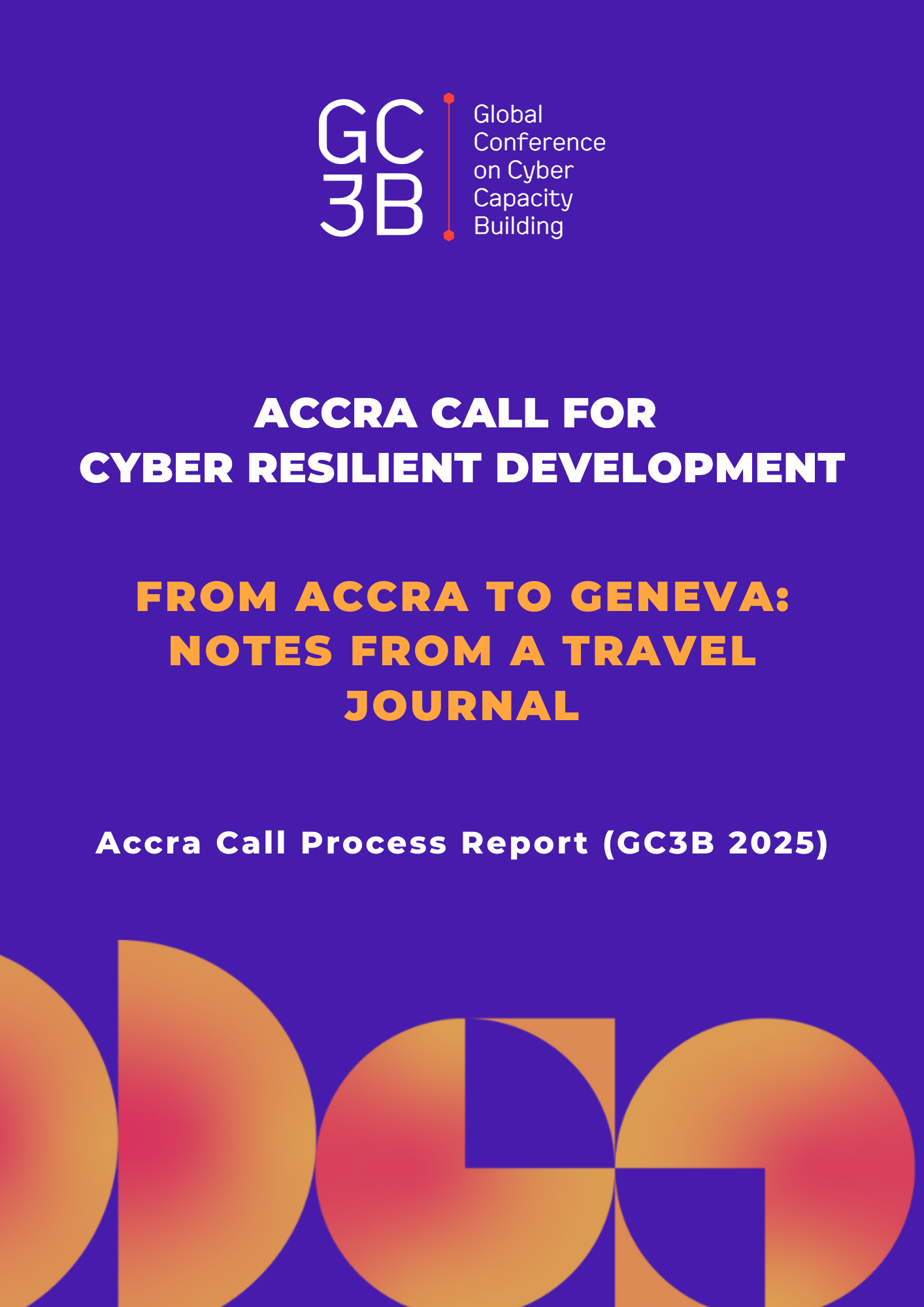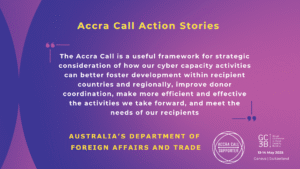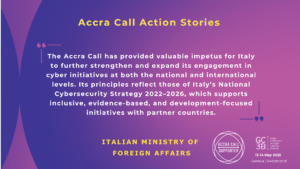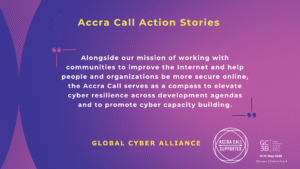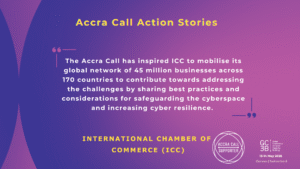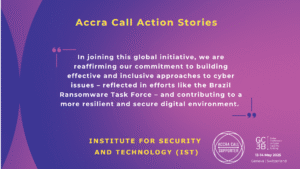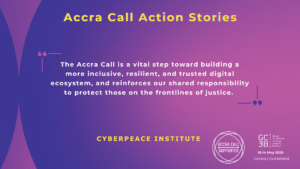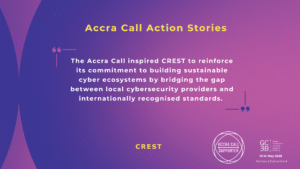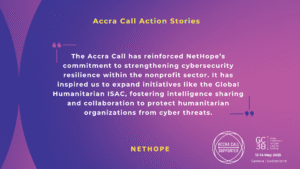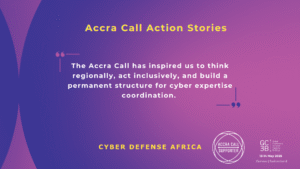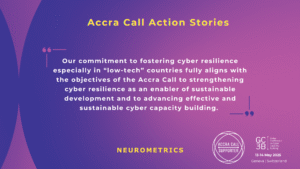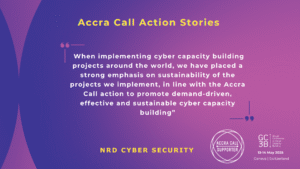The Accra Call
PROGRESS TOWARDS CYBER RESILIENT DEVELOPMENT (2023-2025)
OUTPUTS OF GC3B 2025
Since its launch at the inaugural Global Conference on Cyber Capacity Building (GC3B) in Accra in 2023, the Accra Call for Cyber Resilient Development has grown into a dynamic community effort. Over 80+ organizations have endorsed the Call, and 20 concrete pledges have been made to advance cyber resilience as a critical enabler of sustainable development. From 2023 in Ghana to 2025 in Switzerland and beyond, the Accra Call continues to inspire action and learning. The following showcases the progress achieved so far and celebrates the community’s journey through two flagship outputs:
-
From Accra to Geneva: Notes from a Travel Journal – a reflection on collective progress, insights, and lessons learned;
-
The Accra Call Action Stories – a series of case studies from organizations that have taken tangible steps to fulfill their pledges.
Together, these outputs form a living record of the Accra Call’s impact and ongoing evolution.
Summary of the Accra Call for Cyber Resilient Development: An Action Framework
1 Strengthen cyber resilience as an enabler for development
- Integrate cyber resilience into sustainable development strategies as a cross-cutting priority;
- Mainstream cyber resilience across international development programmings;
- Accelerate the integration of the cyber capacity building community with the development field;
- Strengthen and promote cyber resilience knowledge and skills among international development workforce.
2 Advance demand-driven & sustainable cyber capacity building
- Use cyber capacity building to tackle existing and emerging CCB gaps across policy, technology, legal, regulatory, and institutional frameworks, customized to the local context;
- Invest in capacity building that enhances the cyber resilience of significant economic sectors and public service delivery;
- Consider the cybersecurity skills gap and its gendered dimension across cyber capacity building;
- Commit to further professionalize the cyber capacity building community of practice;
- Accelerate efforts to improve the measurement of cyber capacity building results.
3 Foster stronger partnerships and better coordination
- Foster the leadership of developing countries in coordinating cyber capacity building efforts;
- Promote public-private partnerships as well as inclusive and equitable market incentives to enhance cyber resilience
- Utilize existing platforms to better coordinate and deconflict cyber capacity building financing and actions;
- Encourage greater information sharing and relationship building between the cybersecurity and development stakeholders on cyber threats, incident response and remediation.
4 Unlock financial resources and implementation modalities
- Identify and employ the full range of financial streams available to weave sustainability into the financing of national cyber resilience activities;
- Diversify program implementation modalities and utilize all available options to strengthen cyber resilience capabilities;
- Systematize South-South and Triangular cooperation in international cyber capacity building actions.
From Accra to Geneva: Notes from a Travel Journal
What has the Accra Call become in practice? This journal offers a curated set of reflections drawn from two years of conversations, contributions, and quiet shifts across the cyber capacity building ecosystem. It is not a traditional report. Rather, it is a collection of notes — an attempt to capture the community’s voice as it travelled from Accra to Geneva.
Based on interviews, survey insights, and hands-on experiences, these reflections offer a snapshot of how the Accra Call has been used, interpreted, and internalized. The result is a mosaic of motivations and realities, united by a shared ambition: to place cyber resilience at the core of development.
You can access the travel journal here (or by clicking the cover page to the right).
Among the key observations:
1. The Accra Call motivates, validates, and accelerates action
For many organizations, the Accra Call has served as a catalyst. It has offered a unifying narrative and strategic reference point to guide or strengthen ongoing efforts in cyber capacity building. Whether by shaping internal priorities, like France’s national programming, or reinforcing donor engagement, the Call has helped actors articulate their role in a shared agenda.
2. It inspires new initiatives and informs strategic design
The Call has not only affirmed what many were already doing — it has also sparked new thinking. Its flexible framework has helped organizations such as CREST and the ICC sharpen their strategies, develop new programs, and link cybersecurity to broader development outcomes. These stories illustrate how the Call’s principles are being translated into concrete innovation on the ground.
3. It is sustained from the bottom up
There is no central enforcement mechanism behind the Accra Call — yet it thrives. Its continued relevance has depended on a network of committed individuals and institutions: governments, NGOs, private sector actors, and local leaders who have taken ownership of the Call’s vision. These policy entrepreneurs are not just implementing the Call — they are shaping its future.
4. It must remain dynamic and responsive
While the Call’s original 16 actions remain valid, the community’s priorities are shifting. Initial momentum focused on integrating cyber resilience into development agendas and closing policy or skills gaps. Today, new priorities are emerging: sustainable financing, innovative partnerships, and diversified implementation models. The Call’s real strength lies in its flexibility — but this requires intentional processes to keep it relevant and adaptive.
5. It is a shared responsibility
The vision of the Accra Call is inclusive by design, but its future depends on strengthening collective stewardship. While many actors have aligned their work with the Call, ongoing engagement has remained limited to a smaller core group. A more systematic, whole-of-ecosystem approach is needed — one that enables broad participation, builds accountability, and sustains momentum across the GC3B community.
As we move away from Geneva, these notes are not the end of a journey — but a guiding point. The path forward calls for deeper dialogue, greater alignment, and above all, continued learning as we shape the next leg of the journey together.
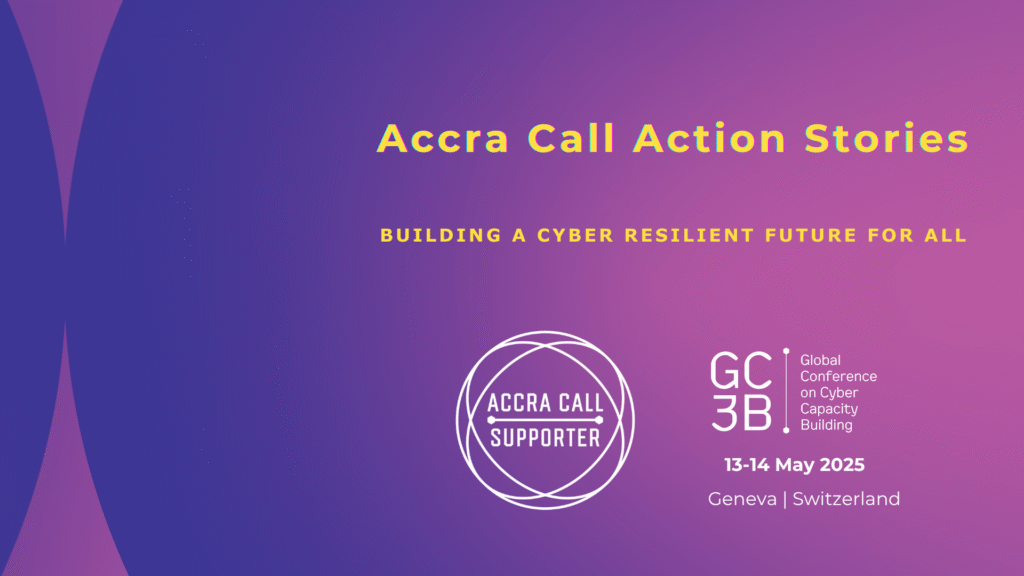
Accra Call Action Stories
These 11 short stories highlight how organizations have translated their Accra Call commitments into tangible impact since 2023. More than a record of activities, each case offers insight into why these actions matter — and how they contribute to more inclusive, resilient, and sustainable digital ecosystems.
Download all Accra Call Action Stories
Support the Accra Call
Progress on the realization of the Accra Call will be reviewed every two years at the next iterations of the GC3B. Between each conference, the Global Forum on Cyber Expertise will foster the multi-stakeholder ‘Accra Call’ community bringing together all its endorsers and pledging organizations, along with any other interested stakeholder in promoting effective, sustainable, and inclusive international cooperation for cyber resilient development in the digital age. The endorsers will be invited to share their experiences from their pursuit of the Call’s actions within their respective mandates. This process will allow the drawing of lessons, successes, and challenges to inform the collective follow-up on the Accra Call at the third edition of the GC3B.
If you are interested in joining these organizations in supporting the Accra Call, please visit the “Support the Accra Call” webpage. For any questions, please feel free to reach out to contact@gc3b.org.
